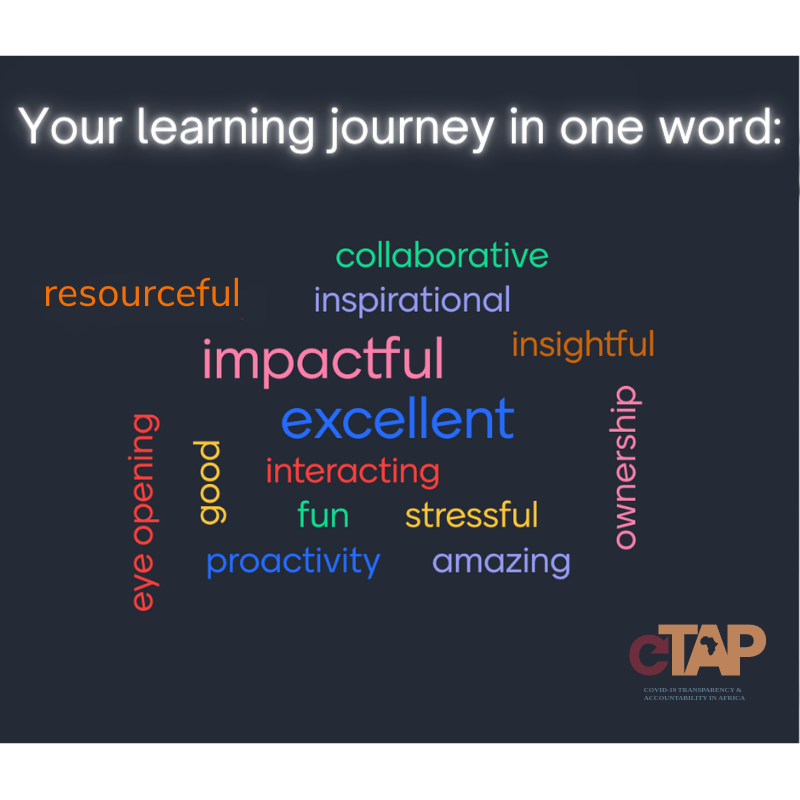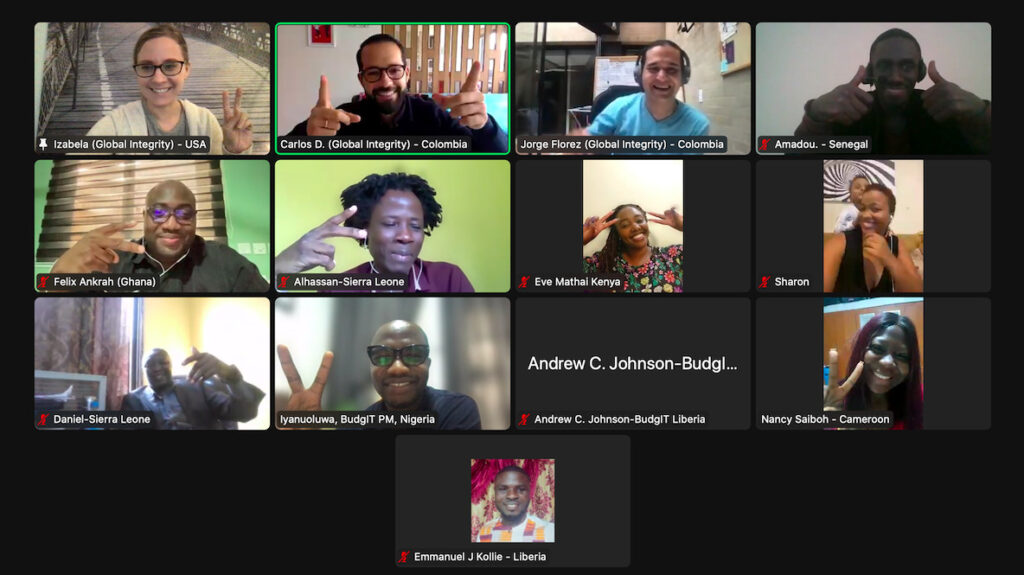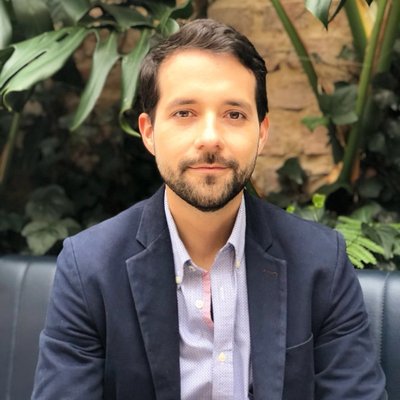Achievements are not easy to measure. Numerical metrics do not truly reflect the ardent and often radius advocacy work that takes many actors and many years to achieve. Whether big or small, every success or challenge leads us to where we are now.
After completing Phase II of the COVID-19 Transparency and Accountability Project (CTAP), we gathered with our nine country leads and their teams to talk about our collective accomplishments and what we have learned along the way.
What are CTAP partners most proud of coming out of the project implementation during Phase II?
On February 28th, we held a virtual peer learning session to exchange experiences and knowledge about strategies used over the course of Phase II.
In the first part of the session, we facilitated an open conversation with the nine country partners about their success stories to consider pivotal factors that allowed them to achieve their objectives and what made them the proudest. We asked our partners to use one word to describe their overall mood and feelings about the project journey so far. Here is what we captured:
Word Cloud

There were a lot of enthusiastic voices commenting on the work behind enhancing accountability and transparency in the healthcare system across Africa. After the coalition meetings, relationships with grassroots communities deepened and became a venue for local challenges to be amplified to the level of Ministries of Health. This approach brought local leaders and women’s groups to the forefront of the advocacy conversations with the government around COVID-19 transparency. CTAP bridged different stakeholders’ demands and collaborating with the media further strengthened the attention on the issues, as Felix Ankrah (CTAP Ghana partner) pointed out.
Influential and like-minded people have also joined the CTAP initiative, as Abraham Varney, the lead from Liberia mentioned. Dr. Angela Benson (Fireside Chat #2) has been an instrumental collaborator who helped to push more accountable and transparent public actions to prepare for the next public health emergency.
In general, the cross-country conversations between partners focused on how making more reliable social accountability in the healthcare sector improves transparency in funding allocation. The leads from BudgIT and CODE Nigeria mentioned that CTAP efforts are not limited to just tracking funds. The partners focused on shaping a constructively critical view on broader accountability matters, developing research related to negligence cases and deviation of funds to ensure projects within the health sector are delivered. Partners collaborated with Ministries of Health and authorities across states, bringing opportunities for collaboration and feedback to the primary healthcare public policy. These were tireless efforts over this phase of CTAP.
Engaging with leaders and mobilizing citizens in different areas through town hall meetings and communication materials was a winning factor. This allowed them to communicate their work better and send straightforward messages, using the local language to transmit the CTAP insights on health accountability issues. As pointed out by the Malawi team, it was essential to partner up with local media and CSOs to use proper channels, like radio stations or influencers, to promote training and conversations around health, using catchy jingles to enhance the discussion and to educate audiences.
Kenya and Sierra Leone country partners considered leveraging relations with the government and deemed them possible. Participating in transnational collaborative initiatives, such as the Open Government Partnership (OGP), and networking with the government is essential to regulate and improve the work in public policy health issues by building collaboration with national and local governments and global partners.
CTAP group

What are the lessons from engaging with various local stakeholders on health accountability to increase impact?
During the latter part of the session, we separated into small groups to share, reflect, and evaluate CTAP partners’ core strategic activities and learnings. To guide the conversation, we asked about the lessons from engaging with various local stakeholders on health accountability and where efforts should persist more. Some lessons stood out:
- Investing in the value of a multi-stakeholder approach is critical to involve all interested sectors and actors. This approach has helped to bring different perspectives from their backgrounds, build trust and empower people to connect and create relationships.
- Understanding the context and framing debates around localized issues and empowering local leaders is a way to focus attention on things that matter. It has helped prevent people from losing interest in health issues now that the pandemic has calmed down, contributing to the sustainability of the discussions.
- Ensuring conversations with relevant people in power and decision-makers continue to work, with clarity on what they can do to contribute and continue advocating for improvements in the health sector.
- Including a gender balance in the conversations and holding meetings with the local leaders while increasing women’s participation so they can also become agents and improve the sustainability of the process for their communities.
- Pointing out that health is more than a human right. Emphasizing and ensuring this is a central part of the motivation to persist with CTAP efforts.
- Being consistent on the cause of mobilization and involving the partners.
- Building analysis that allows the understanding motivations of different stakeholders; this could boost a particular outreach nationally and locally.
- Sharing your progress on social media platforms and your work to give visibility and connect with other audiences.
In the final part of the session, Iyanu Bolarinwa (BudgIT) and Mukhtar Halilu Modibbo (CODE) shared closing remarks on what CTAP showed us regarding the need for more accountability instruments in the health sector. They acknowledged the team’s contributions and for taking the time to learn from each other across different country contexts.
At the end of our peer learning session, partners felt hopeful that the journey to enhance accountability and transparency in the healthcare system across Africa will continue on a positive trajectory. CTAP exposed partners to new perspectives, and peers were motivated to overcome challenges with innovative ideas and persistent advocacy efforts.
We will have more accomplishments to celebrate soon. The second CTAP Learning Report, where we will share more insights about our collective accomplishments over the last 2.5 years together during this unique project. Stay tuned!
If you want to know more about the efforts of local champions in improving health governance efforts, see what we discussed with CTAP country leads about battling vaccine fraud and misinformation & building inclusive health systems.
|







